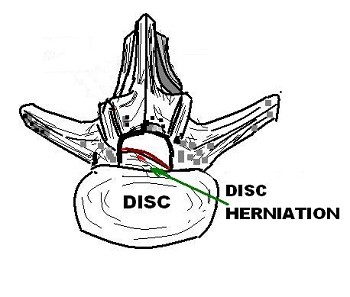Herniated discs are a common source of back pain in workers. Those afflicted may suffer pain for the rest of their lives.

A herniated disc is basically a disc that has slipped out of place and in the process has become ruptured. The cushion in between the vertebrae of the spine is what is referred to as the disc. The resultant pain is usually due to the pinching of the spinal nerves close to the edge of the spinal discs. An injured worker suffering from a herniated disc caused by a workplace accident should consult a workers’ compensation lawyer for guidance and to understand the legal options available.
People Prone To Herniated Disc Injuries
Though herniated disc injuries can happen to anyone, there are those who are more susceptible. Such individuals include the elderly as the disc loses elasticity with old age. Some careers have a higher rate of herniated disc injuries as compared to others. Such careers include:
- Plumbers
- Hospital workers (attendants, nurses, and orderlies)
- Carpenters
- Fire fighters
- Construction workers
- Janitors
The workers’ compensation process can be quite time-consuming and tiring. At times, insurance carriers may dispute claims based on an array of reasons. However, a workers’ compensation attorney may help ensure that the claim is settled.
What You Need To Know About Herniated Discs
A disc lies between each bone in the spine. The discs are made of cartilage that helps in shock absorption and provides flexibility. The disc has two layers; the outer layer is strong while the inner layer has a soft jelly-like appearance. When herniation occurs on the disc, the jelly-like layer leaks out and a resultant bulge is visible in the outer layer’s weak areas. At times the disc presses on nerves in the spinal column, causing pain and nerve damage in some cases. Symptoms include pain and weakness in the area of rupture and in rare cases, loss of bladder control.
In the neck area, herniated discs cause pain and numbness and at times tingling in the back of the skull, neck, shoulder, hand, arm, and scapula. Injuries in the lumbar spine can result in radiating pain, numbness in the legs, buttocks, and feet as well as tingling in these areas. This condition is sometimes referred to as sciatica. In this region it is the most common symptom of a herniated disc.
Diagnosing and Treatment Options
The main tools used for diagnosing a herniated disc are MRIs, X-rays, discograms, and myelograms (a special x-ray of the spinal cord). Bed rest, over the counter prescriptions, and physical therapy are among some of the most commonly used types of treatment. In more serious cases, surgery is necessary. Below are some of the available surgical options.
- Micro-disectomy
- Laminectomy
- Artificial disc replacement
- Fusion surgery (spinal fusion)
If you have been injured at work and are suffering from a herniated disk because of the injury, contact The Law Office of James M. Hoffmann at (314) 361-4300.
Work Related Injuries
Photo credit: commons.wikimedia.org
